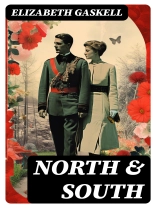In 'North & South, ’ Elizabeth Gaskell masterfully weaves a narrative that juxtaposes the industrial North of England with the genteel South, reflecting on the social upheavals of the 19th century. Through the eyes of Margaret Hale, a young woman from the pastoral South who relocates to the grimy industrial town of Milton, Gaskell employs rich, descriptive prose to explore themes of class conflict, gender roles, and the struggles of the working class. The novel’s intricate character development and detailed setting provide a vivid lens through which readers can examine the tensions between modernity and tradition, and the moral dilemmas faced by individuals amidst societal change. Elizabeth Gaskell, a prominent Victorian novelist, was deeply influenced by her own background and experiences. Having grown up in a middle-class environment and later living in industrial Manchester, Gaskell was acutely aware of the complexities of social class dynamics and the consequences of industrialization. Her deep empathy for the working class, combined with her friendships with mill workers and her awareness of contemporary social issues, informed her writing, allowing her to shed light on the problems of her time in an engaging narrative format. 'North & South’ is essential reading for anyone interested in Victorian literature, social history, or the ongoing discourse on class and industry. Gaskell’s insightful critique of society remains relevant today, making this novel a compelling study of the human condition. Readers will find themselves drawn into Margaret’s journey, experiencing her transformative encounters and ultimately reflecting on the broader implications of class divides.
O autorze
Elizabeth Cleghorn Gaskell, née Stevenson (1810–1865), was a renowned English writer, notable for her detailed portraits of Victorian society. Although often recognized for her empathetic depiction of the working class, her literary scope also extended to the nuances of middle-class life. Gaskell’s profound narratives were drawn from her personal experiences and observations, influenced by her humanitarian concerns and the social issues of her time. 'North & South’ (1855), one of her most acclaimed works, encapsulizes the industrial North and agrarian South’s class conflicts during England’s transformation in the nineteenth century. The novel was innovative for its exploration of gender roles and industrial relations, offering insight into the lives and struggles of its compelling characters. Gaskell’s literary style is recognized for its vibrant characterizations and social commentaries, which are portrayed with a balance of realism and moral consideration. In addition to 'North & South’, Gaskell’s oeuvre includes 'Mary Barton’ (1848), 'Cranford’ (1853), and the biography 'The Life of Charlotte Brontë’ (1857), which established her as a pioneering female biographer. Her writing remains pivotal in the study of literature, especially for its perceptiveness on social issues and its dynamic portrayal of the Victorian era.












